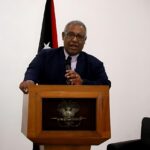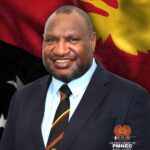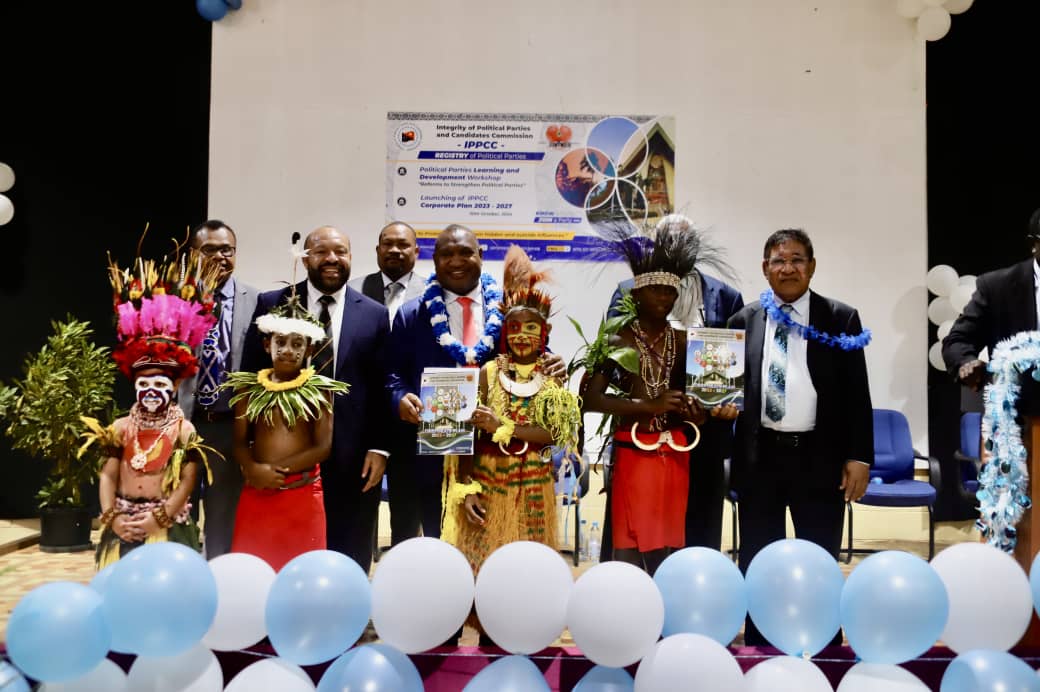Prime Minister Hon. James Marape has praised the Office of the Registrar of Political Parties and Candidates, referring to it as a “watchdog of democracy” for Papua New Guinea. As the organisation responsible for enforcing the Organic Law on Integrity of Political Parties and Candidates (OLIPPAC), Prime Minister Marape emphasised the importance of the Registrar’s role in safeguarding the nation’s democratic principles.
Addressing the launch of the Office’s new Corporate Plan today, Prime Minister Marape urged the Registrar and staff to uphold the highest standards in their work to ensure the resilience and integrity of Papua New Guinea’s democracy.
Reflecting on the nation’s political journey since 1975, Prime Minister Marape highlighted the challenges of political instability that have affected Papua New Guinea, especially in times of economic and political hardship. He credited the late Prime Minister Sir Mekere Morauta, who introduced OLIPPAC in 2001, for establishing a foundational framework to promote stability.
“Sometimes I look back and wish that a Prime Minister like Sir Mekere Morauta, Sir Julius Chan, or Sir Michael Somare had 10 consecutive years or more of leadership of this country so that we would have been much better placed than we are as a country today, as far as social and economic development is concerned,” Prime Minister Marape said, reflecting on the lack of continuity in leadership that has historically hindered sustained development.
Expressing his support for the Office of the Registrar, Prime Minister Marape reaffirmed his government’s commitment to empowering the “watchmen and watchwomen” responsible for overseeing political party integrity. He noted that their role is essential not only during National General Elections but throughout a government’s term to ensure that the political system remains rooted in democratic values.
The Prime Minister highlighted OLIPPAC as one of the most significant reforms in Papua New Guinea’s political history, attributing its success to the efforts of late Sir Mekere Morauta in promoting reforms that strengthened the nation’s governance.
“Some reforms must be made in the context of us going forward, especially under the shadow of 50 years of our nationhood,” he said, signaling a readiness for further improvements in PNG’s political landscape.
Prime Minister Marape also referenced the legacy of the late Grand Chief Sir Michael Somare, whose leadership of the National Alliance Party from 2002-2011 coincided with a period of unprecedented economic growth and political stability. He attributed this success to the stability brought by OLIPPAC, which helped create a conducive environment for development.
Looking ahead, Prime Minister Marape highlighted his government’s plans to introduce a Bill, inspired by recommendations from the Constitutional and Law Reform Commission, to consider the election of the prime minister by the people of Papua New Guinea—an initiative aimed at enhancing the nation’s democratic framework.
He urged the Registrar to explore ways in which political parties can contribute to strengthening the political system, supporting effective governance, and fostering a vibrant democracy in Papua New Guinea.





